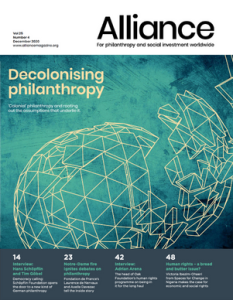The question of ‘part or counterpart’ came to me after a presentation where a group of progressist donors explained the impacts their small donations had on beneficiary groups, without speaking about how the contributions of their ‘beneficiaries’ had impacted the donors or how much they had contributed to the development of the projects.
In the world of philanthropy, donors – in their variety – are a key player. They have the money to donate (and we must always repeat: money means power), define the guidelines and topics for which they want their donations to go, choose the geographical areas in which they will do so, launch the calls with punctilious details of how to present them – including budgets, inform about the evaluation and accountability processes, attach a series of moral clauses and policies of strict compliance and, finally, demand the details of the ‘counterpart’, that is, what are the contributions in cash and in kind that the potential beneficiaries of the donations must contribute.
The latter is the reason for this note. And my first question: is it really a counterpart?
Generally – and even more so in progressist foundations and funds that try to reach the most excluded community groups – the beneficiaries, their families and their ancestors have spent tens, if not hundreds, of years developing survival and development strategies in the most hostile and adverse conditions. Thanks to this, they have managed to stay on their lands even if they do not have property titles, in their jungles although the processes of deforestation advance relentlessly, in their villages abandoned by the state and public services. Women, in particular, have suffered ancestral abuses, have been victims of gender-based violence, and yet they are standing up for their rights in an increasingly massive way and building from below their ‘good living’. That capacity, which many call resilience, and more likely resistance, means enormous accumulated social capital, often at the cost of great suffering, struggles and deaths. And it is precisely that capacity and that capital that is the starting point, their ‘part’, for any development initiative.
Let’s imagine for a moment that the budget of a project and a funding proposal to an international foundation were presented like this:
| Item | Local contribution in US$ | Counterpart (international foundation) in US$ |
| Knowledge of the territory (30 years) | 200,000 | 100 |
| Participation of local social actors (time for talks, negotiations, visits, meetings) | 150,000 | 0 |
| Human resources (activists, volunteers, leaders, trainers) | 300,000 | 30,000 (payment of some salary) |
| Materials and equipment (meeting rooms, own houses, bicycles, motorcycles, cell phones, etc.) | 100,000 | 10,000 (contribution for a computer & a printer) |
| Administration | 40,000 | 10,000 |
| Travel (in own vehicles, on walks, in cars, etc.) | 40,000 | 5,000 |
| Total | 830,000 | 55,100 |
In this case, as in so many others, the counterpart would be much lower than the local contribution, but surely the donation of $55,100 would be greatly appreciated and publicized, but the opposite would not be heard. Therefore, when donors demand that their beneficiaries provide ‘counterparts’ they are in a way subverting historical processes and constructing an erroneous narrative, that could be labelled as ‘colonization’.
To be clear: the counterpart is from the donors and not from the local community. Possessing financial resources to donate, and therefore ‘power’, should not be a justification that prevents having a more humble and respectful vision of cooperative relations. Donors’ resources are only a small help to the gigantic effort and contribution that the communities make daily. Their contribution is the starting point. Without it, there is no possible development project.
Andrés Thompson is Senior Advisor at ELLAS-Women and Philanthropy.
Upcoming issue: Decolonising philanthropy
 The word ‘decolonisation’ was coined to describe the withdrawal of colonial powers from territories they had occupied. What forms have decolonisation practices taken among foundations? Should philanthropy be making reparations? And what significance does decolonisation have for philanthropic institutions when they are geographically distant from the former colonies? These are among the questions to be explored in the next issue of Alliance. Guest edited by Shonali Banerjee, Centre for Strategic Philanthropy, Cambridge University and Urvi Shriram, Indian School of Development Management.
The word ‘decolonisation’ was coined to describe the withdrawal of colonial powers from territories they had occupied. What forms have decolonisation practices taken among foundations? Should philanthropy be making reparations? And what significance does decolonisation have for philanthropic institutions when they are geographically distant from the former colonies? These are among the questions to be explored in the next issue of Alliance. Guest edited by Shonali Banerjee, Centre for Strategic Philanthropy, Cambridge University and Urvi Shriram, Indian School of Development Management.
Subscribe today to make sure not to miss it!






Comments (0)